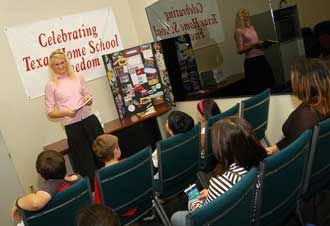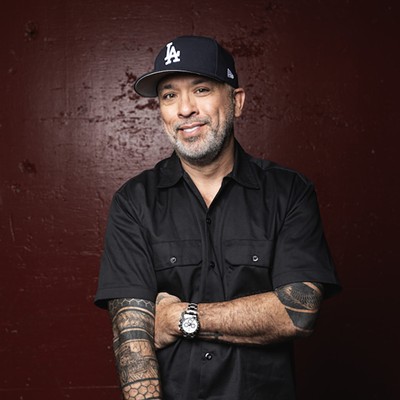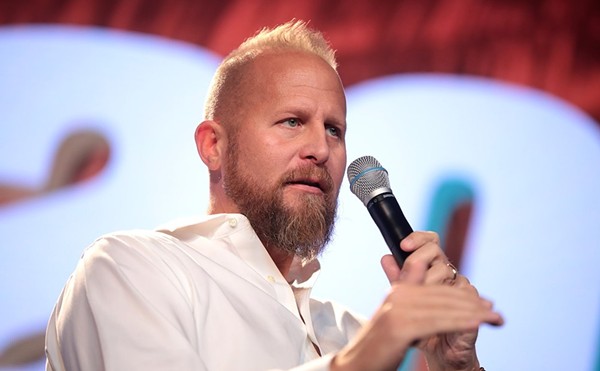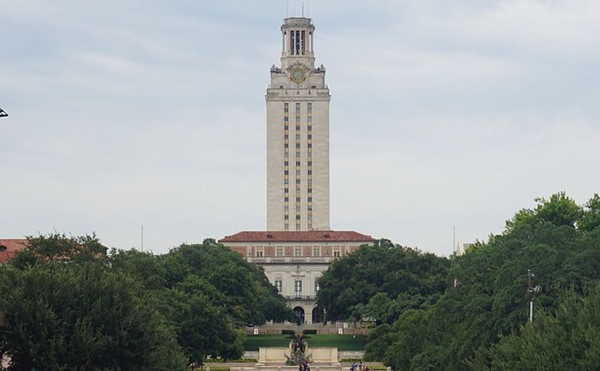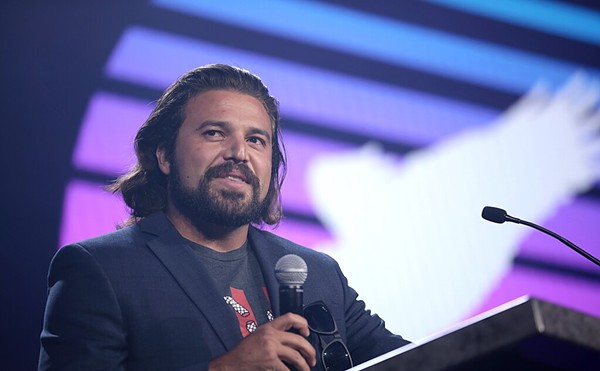| Elizabeth Bean and her homeschooled daughter Julia, 8, stop to read a book together while browsing the selection at the FEAST bookstore. |
It isn’t that the Epsteins don’t like talking about their children’s schooling. In fact, they’re rightly proud of their offspring’s accomplishments: Natasha, 19, an articulate opera aficionado, studies voice and piano and taught herself to play the flute; Joshua, 13, a quiet adolescent, loves books and took it upon himself to organize the family’s voluminous library by the Dewey Decimal System; and Alicia, 11, suffers from a neurological disorder called Rett Syndrome, but despite doctors’ predictions that she would never walk or say a word, has slowly developed the ability to do both.
The grumbling among family members isn’t about what the Epstein children have achieved, but how they’ve reached that level of achievement. For 11 years, Jennifer has homeschooled her children, carefully instilling them with her Christian beliefs and emulating the late-19th-century teaching methods of British educator Charlotte Mason. She has even taught Mason’s flexible-education principles to other homeschooling parents in San Antonio.
“Family and friends who are school teachers don’t understand it at all, because it’s almost like a competition with them,” Epstein, 43, says of her decision to homeschool. “But I think most homeschoolers find that their relatives are hardest on them. I don’t think we have any relatives who are real supportive of it. It’s better not to talk about it.”
Jennifer and Mark were serving in the U.S. Army in Heidelberg, Germany, when they decided to pull Nastasha — then about to begin third grade — out of the traditional school system. A few months earlier, when Natasha enrolled at her Heidelberg school in the middle of second grade, her teacher quickly informed her mother, “I just want you to know that I won’t have any time for your daughter this year because I have some boys in the class who cause a lot of problems. They take all my time.”
Jennifer had barely recovered from that jolt when Natasha began telling stories about being assigned a “shoulder partner” at school.
“The teacher would pair you up with whoever sat next to you, and whoever the smarter one was did all the work,” Natasha recalls. By Jennifer’s reckoning, her daughter was either doing all or none of the work for the team, and neither option was satisfactory.
Around that time, one of Epstein’s friends invited her over for the day to watch her homeschool. After observing for a few hours, Epstein concluded that she was capable of being a home educator.
“I’ve found that most people have a fear of the unknown,” Epstein says. “I think most people are equipped, because that’s something that’s natural in us, to teach our own children. But most people are afraid to, because the world tells them that they have to have a degree to teach.”
Epstein wanted to repay her friend for the lesson, and her friend said the best gift Epstein could give would be to provide similar help to another parent. “So I have spent the last 10 years helping people to get started with homeschooling,” Epstein says.
That’s the way the homeschool movement works. While frequently pegged as isolated extremists who’ve divorced themselves from the mainstream, they’re a self-sustaining community built on support groups and cooperative teaching exchanges (example: you teach my child math, and I’ll teach your child art).
According to surveys, more than 30 percent of homeschooling parents make their decision primarily because they want to teach religious values to their children, but faith doesn’t fully explain the missionary zeal of the homeschool movement. Homeschoolers have forged a tight bond partly because they believe they’ve found the answer to our educational problems, and partly because that unified front has allowed them to overturn legal obstacles that once forced them to hide when school authorities knocked at the door.
Twenty years ago, Texas homeschoolers felt like a persecuted lot. The Texas Education Agency had reviewed a 1923 amendment to the state’s compulsory-education law and determined that it was designed to outlaw homeschooling.
“As a result of that ruling, the TEA began to encourage school districts to prosecute families who were homeschooling, and over 100 families were prosecuted in the intervening years,” says Tim Lambert, president of the Texas Home School Coalition, a political action committee formed in 1986 to fight for homeschoolers’ legal rights. “Some people were fined, or forced to leave the state.”
A 1994 Texas Supreme Court decision in Leeper et al vs. Arlington ISD et al determined that home schools were essentially private schools, and thus exempt from compulsory-attendance requirements. Between that decision and a series of subsequent actions by the legislature, Texas has gone from one extreme to the other, emerging as the state most accommodating to homeschooling interests.
Parents in Texas who wish to pull their children out of the traditional school system need only send written notice to school officials. They do not need to follow any mandated curriculum or any timetable for completing course work. They do not have to follow a consistent school schedule. Their children do not have to take standardized tests administered to public-school students. They simply need to provide assurances that their children “meet basic education goals including reading, spelling, grammar, mathematics, and a study of good citizenship,” according to the TEA.
“I live in Lubbock, and the Lubbock school system is losing students and they’re consolidating schools,” Lambert says. “I think they recognize that one of the factors is that some parents are homeschooling.”
A 1999 study by the Home School Legal Defense Association found that homeschoolers scored 67 points above their traditional-school peers on the SAT. Various studies have also indicated that homeschoolers perform comparably with school-system graduates at the college level.
In a 2003 survey, the National Center for Education Statistics estimated that 1.1 million students were homeschooled in the United States, a 29 percent increase from their 1999 findings. During that four-year period, homeschoolers went from 1.7 percent to 2.2 percent of the American student population. Lambert estimates that 100,000 families currently homeschool in Texas, which translates to somewhere between 250,000 and 300,000 children.
Those numbers hardly signal the death of traditional schools, but they do suggest that homeschooling has emerged as a viable, if controversial, third option for parents disenchanted with public schools and reluctant (or unable) to spend on private schools. Ultimately, though, homeschooling is a choice rarely made for financial reasons.
“My number-one reason is my relationship to my children,” Epstein says. “Because I spend time with them all day, every day, I have a really good relationship with them, and I’m able to develop that relationship.”
| Homeschooled senior and FEAST bookstore employee Bethany Baird (left) provides advice for families considering homeschooling during orientations held daily at the center. |
“I understand some parents’ need for homeschooling, but unless there are extenuating circumstances, or some kind of special needs, I think they do a disservice to their children by homeschooling them,” says Donna New Haschke, president of the Texas State Teachers Association. “There’s a socialization, a camaraderie, being exposed to different kinds of kids, and getting a sense of the real world, that comes from going to school.”
Bethany Baird has heard these arguments, but she generally laughs them off. Baird, 18, is a tall, blonde, affable high-school senior, and the third of eight children in her family, all of whom were homeschooled. Like many home-educated teenagers, she seems almost eerily poised and mature, as if avoiding the peer pressure and cliquishness associated with high school somehow enabled her to leap prematurely to adulthood.
Baird works at FEAST (Family Educators Alliance of South Texas) bookstore, where she also teaches homeschooling-orientation classes to interested parents. FEAST is a non-profit formed in 1989 to serve the growing homeschool community of San Antonio, and it has emerged as the epicenter of local home-education activity.
At the FEAST bookstore, you can assemble your own Christianity-based education plan, either by purchasing a boxed LIFEPAC curriculum ($55), a Bob Jones University Press Homeschool Mega-Kit (generally running more than $400 for each grade level), or a self-styled mix of various reading materials. The science books available at FEAST emphasize God as the sustainer of nature, and if you browse the bookstore’s shelves, you can also find educational relationship books with titles such as Sex is Not the Problem (Lust Is) and God’s Gift to Women.
In a sense, FEAST creates a campus-like environment for parents and students who wouldn’t otherwise have a campus at which to congregate. FEAST provides a college-resource center, organizes sports activities, and coordinates tutoring services for home-school students who need help that their parents can’t provide. Above all, it’s a relentless source of encouragement to nervous parents.
A 30-minute video shown to prospective homeschoolers at FEAST’s orientation classes emphasizes that homeschooling has a proud history. Its litany of famous Americans who were homeschooled includes George Washington, Benjamin Franklin, Theodore Roosevelt, and Douglas MacArthur. The video even traces its arguments to the Old Testament, suggesting that Deuteronomy 6:7 (“Repeat `God’s commands` again and again to your children. Talk about them when you are at home and when you are on the road, when you are going to bed and when you are getting up.) advises parents to homeschool.
The video forcefully debunks the common contention that traditional schools provide intangible social benefits. Homeschool advocate Gregg Harris argues that when children are bracketed into an age-segregated school environment, they “pool their ignorance.” He believes this results in the creation of a youth culture, leading to rampant drug abuse and sexual promiscuity.
Baird has been homeschooled since kindergarten, so, in a way, she has little to compare it to. But she says she’s observed the effects of public school on friends, and doesn’t like what she’s seen.
“With a lot of them, I notice the difference,” she says. “From the younger kids, it’s just their character and their respect for their parents and the way they play with each other. It’s a little bit more demanding and selfish and all about themselves. The way our family has done it, we teach that it’s not all about us, and you have to be kind and share with everyone.”
Baird says one of her neighbors attended public schools for years, but decided, as she approached her freshman year of high school, that she wanted to withdraw from the school system: “She wanted to be homeschooled because it was too overwhelming for her, with all the pressures and everything, so she finally convinced her mom.”
While it is often assumed that homeschoolers miss out on the opportunity to compete in sports, both Baird and her brother Stephen are accomplished basketball players who have attracted college scholarship offers. Baird has competed in prestigious Amateur Athletic Union (AAU) summer-league play, but says that college scouts flew down to watch her play with her homeschool team after various coaches spread the word about her skills.
But even with the major legal strides made by Texas homeschoolers over the last two decades, Tim Lambert continues to worry about the shortage of extracurricular options available in rural areas, where there are not necessarily enough students to form homeschool sports leagues. His organization has repeatedly sponsored legislation that would allow homeschoolers to participate in extracurricular activities at public schools, but this effort has stalled with the legislature. As with most aspects of homeschooling, credible cases can be made for both sides. Homeschoolers point out that they pay property taxes and should be entitled to the same services as public-school students. On the other hand, state-education funding is based on attendance rolls, so the schools do not receive state money for homeschoolers.
“I’m opposed to having homeschool kids involved in `University Interscholastic League` activities,” Haschke says. “If they’re not going to schools, then they should compete on their own.”
When Michelle Kretzschmar moved to San Antonio from Houston, she looked for a homeschool support system, and found that most of it was based around FEAST.
“FEAST helps a lot of people, but they’re very religiously oriented, and that’s not me,” Kretzschmar says.
Unlike many parents, Kretzschmar didn’t view homeschooling as a means to pass along religious principles, or to protect her child from what some social critics view as the moral decay of the American school system. She considers herself a supporter of public schools, and opposes vouchers that benefit private institutions.
Kretzschmar turned to homeschooling because her son Ethan, who had just completed first grade, would not sit still in class and was continually tipping over his chair.
“I looked into Montessori schools,” Kretzschmar says. “I finally realized I was looking for a home-like environment.”
Becoming a homeschool teacher was a difficult career move for Kretzschmar. She has a master’s degree in Public Affairs from the University of Texas, with years of experience working for the UT Medical Branch in Galveston. She didn’t look forward to quitting her job.
She also worried that she might not be an effective teacher. She laughs when she recalls that Ethan, now 14, suggested at the time that she might not be “smart enough” to teach him, but it wasn’t a laughing matter then.
“It was very scary,” she says of her introduction to home education. “The first thing I tell people is, ‘Don’t panic.’”
As with many other home educators, Kretzschmar soon discovered that she didn’t need to stick with a strict curriculum, and that one of the great benefits of homeschooling is the flexibility it provides.
“Once you start homeschooling, you’re in a different time frame,” she says. “What takes six hours in school can be done in two or three hours at home. `Ethan` can get his school work done and play baseball, do fencing, learn German, and still have time to play video games.”
Eager to provide homeschoolers with a support group that did not focus on religion, Kretzschmar formed San Antonio Home Education Resources and Opportunities. Her encounters with other parents have convinced her that distressing stories about so-called “unschoolers” — children who stay at home and zone out in front of the television all day — are, if not an urban legend, at least wildly exaggerated.
But homeschool critics fret that a system that demands no accountability from home educators offers no protection for children with irresponsible or misguided parents.
“In Texas, accountability has to do with the fact that you’re spending public money. Private schools are not accountable,” Kretzschmar counters. “When you think about it, you don’t need a license to be a parent, or to feed your child. So you shouldn’t need a license to teach them.”


